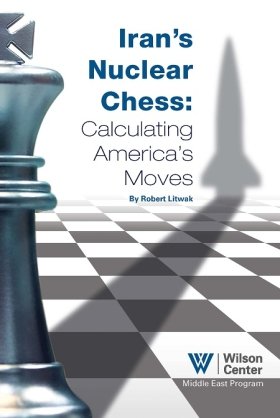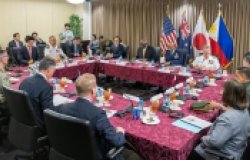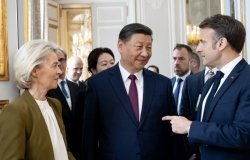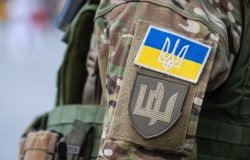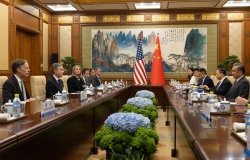As Iranians Welcome Nuclear Deal, Khamenei’s Reaction Is Key
"President Rouhani clearly will have popular support. But in Iran and abroad, eyes will be trained on the supreme leader, Ayatollah Ali Khamenei," write Haleh Esfandiari and Robert Litwak.
The mood in Tehran Thursday night was jovial. Ordinary Iranians celebrated the comprehensive framework regarding Iran’s nuclear program. The accord, which specifies the technical parameters for a final agreement, offers Presidents Barack Obama and Hasan Rouhani winning political narratives to sell their nuclear diplomacy at home in the face of hard-line opposition. Not surprisingly, however, the carping has begun.
On Thursday, Iranians were able to watch President Obama’s Rose Garden speech about the framework agreement live on state TV. Some took selfies with the president on the television screen in the background. Shortly after the announcement, drivers in Tehran began honking their horns; ISNA, the student news agency, reported that people poured out into the streets of the Iranian capital to express their pleasure. A crowd gathered at the Foreign Ministry in Tehran, mostly young people, some making the victory sign with their hands, some of the women in full Islamic dress. Businessmen and industrialists, hard-put to obtain goods and spare parts under sanctions, told reporters they could feel relief.
President Rouhani clearly will have popular support. But in Iran and abroad, eyes will be trained on the supreme leader, Ayatollah Ali Khamenei. It is hardly possible that the Iranian negotiating team signed on to the framework agreement without securing his approval, article by article. But hard-liners may well begin to dissect the understanding, fault the many concessions that Iran had to make, and seek to undermine it. The editor of the hard-line newspaper Kayhan has written that “we gave away a saddled horse and received only broken reins in return.” Such a statement underscores how critical Ayatollah Khamenei’s unequivocal and public support for the agreement and the negotiating team will be over the coming days and weeks.
For Mr. Obama, the accord vindicates his policy of diplomatically engaging adversarial states. The agreement meets core U.S. national security requirements: It meaningfully limits the scope of Iran’s nuclear program; extends the “breakout” time that Iran would need to acquire nuclear weapons should it pursue them; requires continuous monitoring at declared sites; allows the International Atomic Energy Agency access to inspect undeclared sites; and it offers sanctions relief for Iran while allowing for sanctions to be snapped back should the regime fail to comply with the agreement’s terms.
Overall, the agreement makes the best of the bad situation Mr. Obama inherited when he became president in 2009: Iran possessed an advanced nuclear program with thousands of centrifuges already enriching uranium. The goal of zero enrichment–pressed by Israeli Prime Minister Benjamin Netanyahu and some members of Congress–was never realistic. Their opposition to nuclear diplomacy is rooted in their view that the threat posed by Iran arises from the character of its regime and that this accord does nothing to address other issues of concern, notably Iran’s sponsorship of terrorism and its increasingly assertive regional role. Broadening the agenda to encompass these points is likely to have scuttled the nuclear diplomacy. The drawn-out negotiations yielded an agreement that is important in its own right by addressing an urgent threat–and should be judged in those terms. To the Obama administration, the fact that the accord might also bolster the position of President Rouhani and reformists in Iran is a bonus.
The opinions expressed here are solely those of the authors.
This article was originally published in The Wall Street Journal's Washington Wire.
About the Authors

Middle East Program
The Wilson Center’s Middle East Program serves as a crucial resource for the policymaking community and beyond, providing analyses and research that helps inform US foreign policymaking, stimulates public debate, and expands knowledge about issues in the wider Middle East and North Africa (MENA) region. Read more


